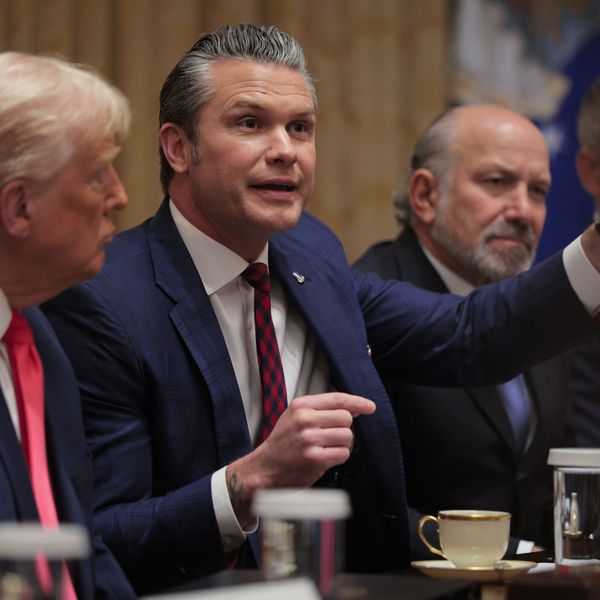Gen. Petraeus Goes to Media War
It's already history. In mid-August 2010, the U.S. commander in Afghanistan launched a huge media campaign to prevent any substantial withdrawal of military forces the next summer.
The morning after Gen. David Petraeus appeared in a Sunday interview on NBC's "Meet the Press" to promote the war effort, the New York Times front-paged news of its own interview with him -- reporting that the general "suggested that he would resist any large-scale or rapid withdrawal of American forces."
In fact, the general signaled that he might oppose any reduction of U.S. troop levels in Afghanistan a year from now. During the NBC interview, the Times noted, "Petraeus even appeared to leave open the possibility that he would recommend against any withdrawal of American forces next summer."
On Monday, the Washington Post also published the twisty line of the suddenly interview-hungry Petraeus, reporting that "he remains supportive of President Obama's decision to begin withdrawing troops next July, but he said it is far too soon to determine the size of the drawdown." The newspaper observed that "the general's presence in Kabul, as opposed to the U.S. Central Command headquarters in Tampa, could make him a far more forceful voice for attenuating the drawdown if he chooses to make that case."
"Attenuating the drawdown" means keeping the war machinery at full throttle.
Let's be clear about what's happening here. The top U.S. military commander in Afghanistan, with the evident approval of the White House, has launched a fierce media blitz to cripple the policy option of any significant military withdrawal a year from now. Riding high in what is supposed to be a civilian-run military, Petraeus is engaging in strategic media operations to manipulate what should be a democratic process on matters of war and peace.
Who bears ultimate responsibility for this manipulative, anti-democratic behavior? The commander in chief.
Ominously, the Petraeus media offensive got underway just days after presidential spokesman Robert Gibbs picked a fight with the progressive wing of the Democratic Party -- a wing that has been strengthening its opposition to the war in Afghanistan.
More than four decades after President Johnson used the term "nervous Nellies" to disparage the growing number of Democrats who voiced dissent about the war in Vietnam, the Obama White House is now disparaging progressive dissenters with terms like "the professional left."
Every week, President Obama is sacrificing billions of dollars and uncounted lives in the service of what Martin Luther King Jr. called -- at a time of another horrific war effort -- "the madness of militarism." Then, as now, a Democrat in the White House augmented the momentum of the Pentagon's war train, boosting it with eagerness to appear tough and avoid Republican charges of weakness.
While history is not exactly repeating, it is rhyming. Like a dirge.
Now, as in the era of Dr. King's final years, war is escalating while the lures of silence or equivocation are widely viewed as prudent. Rationales for muting dissent keep pitching for complicity.
The immediate problem is one of political acquiescence. Right now, it's time to speak up against the efforts by a top general to stampede this country into more war. No matter who is willing to go along with the madness of militarism, we must not.
An Urgent Message From Our Co-Founder
Dear Common Dreams reader, The U.S. is on a fast track to authoritarianism like nothing I've ever seen. Meanwhile, corporate news outlets are utterly capitulating to Trump, twisting their coverage to avoid drawing his ire while lining up to stuff cash in his pockets. That's why I believe that Common Dreams is doing the best and most consequential reporting that we've ever done. Our small but mighty team is a progressive reporting powerhouse, covering the news every day that the corporate media never will. Our mission has always been simple: To inform. To inspire. And to ignite change for the common good. Now here's the key piece that I want all our readers to understand: None of this would be possible without your financial support. That's not just some fundraising cliche. It's the absolute and literal truth. We don't accept corporate advertising and never will. We don't have a paywall because we don't think people should be blocked from critical news based on their ability to pay. Everything we do is funded by the donations of readers like you. Will you donate now to help power the nonprofit, independent reporting of Common Dreams? Thank you for being a vital member of our community. Together, we can keep independent journalism alive when it’s needed most. - Craig Brown, Co-founder |
Norman Solomon is the national director of RootsAction.org and executive director of the Institute for Public Accuracy. The paperback edition of his latest book, War Made Invisible: How America Hides the Human Toll of Its Military Machine, includes an afterword about the Gaza war.
It's already history. In mid-August 2010, the U.S. commander in Afghanistan launched a huge media campaign to prevent any substantial withdrawal of military forces the next summer.
The morning after Gen. David Petraeus appeared in a Sunday interview on NBC's "Meet the Press" to promote the war effort, the New York Times front-paged news of its own interview with him -- reporting that the general "suggested that he would resist any large-scale or rapid withdrawal of American forces."
In fact, the general signaled that he might oppose any reduction of U.S. troop levels in Afghanistan a year from now. During the NBC interview, the Times noted, "Petraeus even appeared to leave open the possibility that he would recommend against any withdrawal of American forces next summer."
On Monday, the Washington Post also published the twisty line of the suddenly interview-hungry Petraeus, reporting that "he remains supportive of President Obama's decision to begin withdrawing troops next July, but he said it is far too soon to determine the size of the drawdown." The newspaper observed that "the general's presence in Kabul, as opposed to the U.S. Central Command headquarters in Tampa, could make him a far more forceful voice for attenuating the drawdown if he chooses to make that case."
"Attenuating the drawdown" means keeping the war machinery at full throttle.
Let's be clear about what's happening here. The top U.S. military commander in Afghanistan, with the evident approval of the White House, has launched a fierce media blitz to cripple the policy option of any significant military withdrawal a year from now. Riding high in what is supposed to be a civilian-run military, Petraeus is engaging in strategic media operations to manipulate what should be a democratic process on matters of war and peace.
Who bears ultimate responsibility for this manipulative, anti-democratic behavior? The commander in chief.
Ominously, the Petraeus media offensive got underway just days after presidential spokesman Robert Gibbs picked a fight with the progressive wing of the Democratic Party -- a wing that has been strengthening its opposition to the war in Afghanistan.
More than four decades after President Johnson used the term "nervous Nellies" to disparage the growing number of Democrats who voiced dissent about the war in Vietnam, the Obama White House is now disparaging progressive dissenters with terms like "the professional left."
Every week, President Obama is sacrificing billions of dollars and uncounted lives in the service of what Martin Luther King Jr. called -- at a time of another horrific war effort -- "the madness of militarism." Then, as now, a Democrat in the White House augmented the momentum of the Pentagon's war train, boosting it with eagerness to appear tough and avoid Republican charges of weakness.
While history is not exactly repeating, it is rhyming. Like a dirge.
Now, as in the era of Dr. King's final years, war is escalating while the lures of silence or equivocation are widely viewed as prudent. Rationales for muting dissent keep pitching for complicity.
The immediate problem is one of political acquiescence. Right now, it's time to speak up against the efforts by a top general to stampede this country into more war. No matter who is willing to go along with the madness of militarism, we must not.
Norman Solomon is the national director of RootsAction.org and executive director of the Institute for Public Accuracy. The paperback edition of his latest book, War Made Invisible: How America Hides the Human Toll of Its Military Machine, includes an afterword about the Gaza war.
It's already history. In mid-August 2010, the U.S. commander in Afghanistan launched a huge media campaign to prevent any substantial withdrawal of military forces the next summer.
The morning after Gen. David Petraeus appeared in a Sunday interview on NBC's "Meet the Press" to promote the war effort, the New York Times front-paged news of its own interview with him -- reporting that the general "suggested that he would resist any large-scale or rapid withdrawal of American forces."
In fact, the general signaled that he might oppose any reduction of U.S. troop levels in Afghanistan a year from now. During the NBC interview, the Times noted, "Petraeus even appeared to leave open the possibility that he would recommend against any withdrawal of American forces next summer."
On Monday, the Washington Post also published the twisty line of the suddenly interview-hungry Petraeus, reporting that "he remains supportive of President Obama's decision to begin withdrawing troops next July, but he said it is far too soon to determine the size of the drawdown." The newspaper observed that "the general's presence in Kabul, as opposed to the U.S. Central Command headquarters in Tampa, could make him a far more forceful voice for attenuating the drawdown if he chooses to make that case."
"Attenuating the drawdown" means keeping the war machinery at full throttle.
Let's be clear about what's happening here. The top U.S. military commander in Afghanistan, with the evident approval of the White House, has launched a fierce media blitz to cripple the policy option of any significant military withdrawal a year from now. Riding high in what is supposed to be a civilian-run military, Petraeus is engaging in strategic media operations to manipulate what should be a democratic process on matters of war and peace.
Who bears ultimate responsibility for this manipulative, anti-democratic behavior? The commander in chief.
Ominously, the Petraeus media offensive got underway just days after presidential spokesman Robert Gibbs picked a fight with the progressive wing of the Democratic Party -- a wing that has been strengthening its opposition to the war in Afghanistan.
More than four decades after President Johnson used the term "nervous Nellies" to disparage the growing number of Democrats who voiced dissent about the war in Vietnam, the Obama White House is now disparaging progressive dissenters with terms like "the professional left."
Every week, President Obama is sacrificing billions of dollars and uncounted lives in the service of what Martin Luther King Jr. called -- at a time of another horrific war effort -- "the madness of militarism." Then, as now, a Democrat in the White House augmented the momentum of the Pentagon's war train, boosting it with eagerness to appear tough and avoid Republican charges of weakness.
While history is not exactly repeating, it is rhyming. Like a dirge.
Now, as in the era of Dr. King's final years, war is escalating while the lures of silence or equivocation are widely viewed as prudent. Rationales for muting dissent keep pitching for complicity.
The immediate problem is one of political acquiescence. Right now, it's time to speak up against the efforts by a top general to stampede this country into more war. No matter who is willing to go along with the madness of militarism, we must not.

